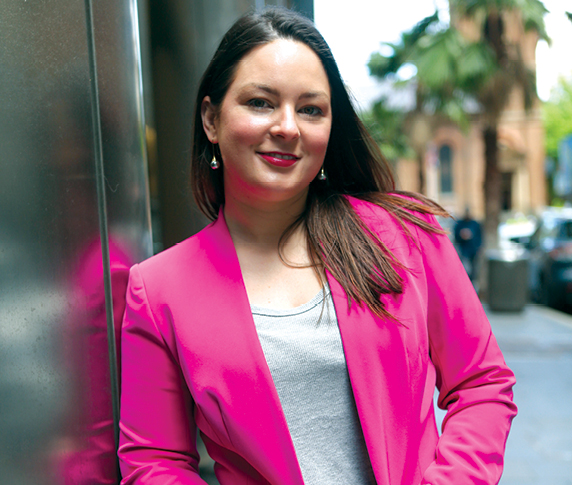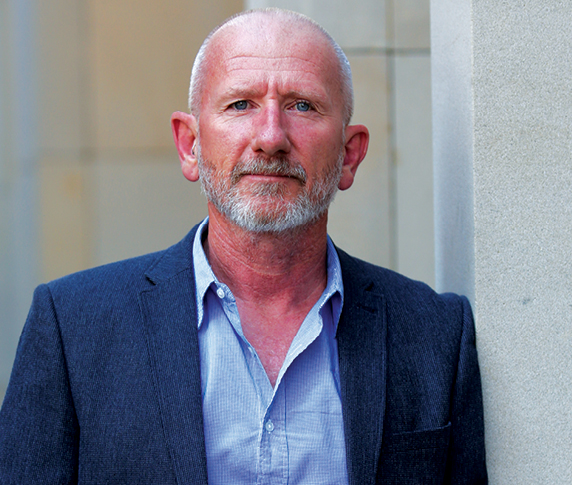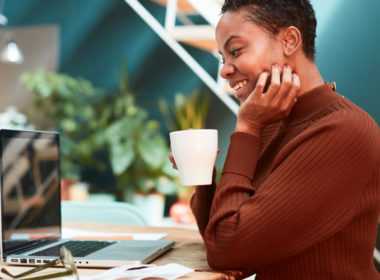The coronavirus has caused the profession to innovate and the best innovations are ones that are proactive, involve technology and are merging a more holistic approach to caring for clients.
It’s been a hell of a year, but it’s not all doom and gloom. LSJ sits down with three legal professionals to dissect how COVID-19 has impacted them and how they have made the most of a challenging situation.
Prefer to watch the video? Short version (4 minutes) Long version (19 minutes)

Courtney Bowie
FOUNDER AND PRINCIPAL, HER LAWYER
I’ve also noticed the toll it has taken on my team as well as some of my clients. You can feel the stress and tension in people when you talk to them. People’s limits are lower, and their fuses are shorter. I’ve tried to be open about my mental health journey and share my experience. It’s a challenging topic, though. A lot of people think if they admit to having mental health issues, it means that they’re weak. It’s important we try and de-stigmatise it.
The most impactful thing I did during the pandemic was set up a COVID-19 small business advice group on Facebook. I set that up with some colleagues in accounting, digital marketing and business strategy. It was really because when the lockdown started, I was feeling so anxious and nervous and I knew that I was not the only one feeling this way. We set up the group to offer our support to people in a really easily accessible way. During the progressive lockdowns, the government announced some pretty complex initiatives such as JobKeeper, and we were able to decode it in real time via Facebook live videos. I think we had 1,500 people in a session where we explained what JobKeeper was all about, who could get it, who couldn’t get it, and when you needed to do things by. I feel like that was a really good use of our time and something I’ve taken lessons away from that inevitably will turn into other ideas.
The biggest impact of the pandemic was the toll it took on mental health. Personally, I suffer from anxiety and depression, and the stress of the pandemic definitely added to that.
I think the most innovative changes that have come about in the pandemic have been institutional. Allowing the virtual witnessing of wills, power of attorney and estate planning documents was well overdue. Another positive change is virtual courtrooms. One of my colleagues told me her eight-year-old son ran naked behind her while she was in a hearing, which made everyone laugh. The virtual way of doing things can actually make people feel more connected. When you can see somebody’s home behind them, you can hear their kids laughing or their dog barking, it brings us all onto the same level in a really meaningful way.
The pandemic has taught me that we have to be careful with where we’re spending our time. We only have a limited amount of energy each day and, during a period of high stress, we have less. Time blocking is a great way to manage this. If you’re trying to be more innovative, I suggest putting on your outside glasses. Look at your business processes, the areas where you are spending time but wish you weren’t, and find out what isn’t working. Then think how to solve the problem. No idea is a stupid idea. Write down anything that pops into your head and brainstorm all the potential answers. Another tip is that you don’t have to be an expert in everything. Find an expert to help you. There’s lots of people in really niche fields who can help with areas such as legal technology and legal design thinking. The other thing I would recommend is to start small. You don’t need to break down your entire business and start again. You can’t expect to innovate everything overnight.
I created the law firm Her Lawyer for ambitious women in business. The traditional law firm model was pretty inaccessible to female entrepreneurs, so I created a service that was friendly, flexible, approachable and helped to empower women. I think women need to be empowered now more than ever. The pandemic has hit women harder and they’re going to need help to be able to lift out of this time. I also manage a Facebook group called ‘Ladies Who Lawyer’ with almost 5,000 members. It’s really important for women in law to have a safe space to get together to share ideas and talk openly about their challenges so they can move through the profession with confidence.
Going forward, I think a lot of big firms are going to return to business as usual, but I think the people in those firms have seen the light. We’re probably going to see more freelancer firms and people not wanting to work in a traditional law firm model. I really hope we see a shift towards flexibility, working really efficiently with technology and working smarter not harder. I feel like the pandemic is a turning point for us as a profession and we don’t need do things the way they’ve always been done. Let’s take what we’ve learned from this time and use it to build the profession of the future.”
 Terri Janke, Solicitor Director of Terri Janke and Company
Terri Janke, Solicitor Director of Terri Janke and Company

Jessica Der Matossian
REGISTRAR, DIGITAL PRACTICE, FEDERAL COURT OF AUSTRALIA
During the pandemic, we’ve taken the digital litigation experience, the practices and procedures, and we’ve put it into an online platform. For the Federal Court, our selected and recommended platform is Microsoft Teams. From there it was a matter of building a workable framework, refining our practices, developing supporting documentation, training and re-training. Some judges have had away with some of the formalities such as standing when the judge joins or standing when addressing the court. Some have even opted to have coffee and tea, as long as it’s not too visible on the screen. We’ve obviously had to preserve the principles of open justice as well, so members of the public are able to contact the associate to ask for a link which will be sent to them.
The court’s mantra has always been to take suggestions about the use of technology with an open mind, having regard to the needs of the judge, the parties and the nature of the case. That hasn’t been different during COVID-19. What we try to do is, when we have a problem before us, we get together [and] have a multi-disciplinary team. That’s really been to our strength, because we open up the channels to everybody at the court to make suggestions and develop best practices. We don’t rely on the same handful of people to deliver solutions to each problem. In some respects, job descriptions have gone out the window. We’ve got in-house lawyers and policy officers getting across the technology, we’ve got management jumping into the courtroom to make connections and to trouble shoot, we have judges conducting training sessions so that people such as myself are relieved to be able to provide responsive support.
The pandemic has verified my existence as a digital registrar. But putting aside the health and economic risks, I think the impact on the Federal Court has actually been a very positive one. We’ve seen very real and enduring barriers shattered quite literally overnight.
I think the legal and judiciary sector, in all its complexities, has focused for so long on building bespoke technology and bespoke business application. When you opt in for an off-the-shelf product, it forces you to take a step back, to re-evaluate some of your practices – and you may find that some of them are archaic. There’s a lot of cost, time and resources that go into bespoke technology. Given how courts and organisations are now using Microsoft Teams, WebEx and Zoom – we’re seeing that that can actually work really well.
Given there is just so much data available to us now and data is very quickly becoming a valuable asset, tapping into artificial intelligence is here and now. Even the courts have ventured into it through the family law space where we built a prediction tool so parties who have gone through the breakdown of a relationship can work out what is the best division of their assets. What we’re also seeing in the legal sector is people jumping on the user-centric bandwagon. In my opinion, they are the best innovations because they’re empowering clients and litigants by giving them the information to make informed decisions.
For lawyers seeking to be more innovative, I have three practical tips. The first is to start with the hybrid model – you don’t need to transition to a fully digital environment in order to be innovative. Not all things a lawyer does lend [themselves] to being digital. The second is to focus on training your support staff. If you provide all the training to those who support you, then, as lawyers and barristers and judges, you’re left to focus on the legal issues before the court. The third is to take suggestions about innovation from everybody in your organisation. Sometimes what you think are the most farfetched ideas are actually the most promising. Take law grads, for example. I know that they’re the newcomers, but they’re so bright and technology is second nature to them.
The biggest lesson I’ll take away from this year is not to wait until something is perfect before introducing it. We spend so much time trying to perfect a process or a technological set up, we end up creating delays ourselves. Sometimes it’s just about giving it a go, a series of trials and errors, and for the judges or members of the profession to just figure it out. A key challenge going forward is trying to work out what’s next. How do we take all the lessons learnt and implement them in a post-COVID world? I think what we’ll see is that so much of what we’ve achieved now will become very permanent in a post-COVID world.”
 Emma Heuston, Founder and Principal, The Remote Expert
Emma Heuston, Founder and Principal, The Remote Expert
I’ve spent five years trying to keep my son and pets out of my Zoom calls, and all of a sudden I was seeing other people on LinkedIn proudly showing off their home situation. I think that has been a really positive side of things. Everyone’s a bit more authentic.

Tim Leach
DIRECTOR, CLCNSW
Who could say they were prepared for the impacts of COVID-19? I do think there are some aspects of our service model that meant we were better prepared than some. I think we are a reasonably nimble sector. We are administratively lean and policy agile: we can make changes to our service delivery models pretty quickly. That said, we were not prepared.
We used to do face-to-face service delivery, and we would have drop-in clinics where people would just rock up, but we had to change to phone and online. So that was quite the challenge and I think all sectors had to deal with that. I think the challenge for us was trying to deal with that rapid transformation in service delivery at the same time as we were experiencing that huge increase in demand for services.
Collectively, I think we were able to work off each other and come up with some pretty innovative responses. Peer connection, trying to grapple with those problems [together], is really useful. We had a lot of people on the calls. It’s a collegiate sector generally, but I did think people really stepped up. We have great diversity across the membership, so there are big centres and little centres and I thought the way people pooled their resources, shared their resources … [saying things like] ‘I will share this document, this policy with you’ or ‘I will send you someone to fill in that shift’, that was really fantastic.
Speaking for my own sector, I think remote work has to be a good innovation, and that remote operation will stay in some form post-pandemic. That is good for work-life balance and the challenge for our sector – and all sectors, I suppose – is to work out how much we can afford to keep. I think the way we targeted the kinds of legal issues that were cropping up for clients really quickly was innovative. Pretty much from the get-go we knew people were having issues with their tenancy, and issues with credit and debt. A lot of people were falling out of work [and] wanting to make sure they got their entitlements. It was a messy environment, that employment space, and people who suffer most in those situations are the vulnerable, the people who have less power in the workplace.
[When the pandemic struck], suddenly there was a whole population of people who had a need for free legal services, when they didn’t have that need before. Now they are seeking that support from us. I would say the biggest impact was the huge and overnight increase in demand for the services we provide.
I think it would be a bit arrogant of me to have advice for all lawyers, but in terms of the innovation in my sector, the single most useful thing we did was that we got everybody together. We have 40 centres and, in normal times, we would meet four times a year. But at the height of the pandemic we were meeting every week, putting the problems on the table and asking, ‘Who’s got a solution?’
 Helen Kay, Managing Director, Rise Legal
Helen Kay, Managing Director, Rise Legal
We have to embrace technology and find ways to make it more efficient. The onset of the pandemic meant that lawyers and businesses who were able to work flexibly and had systems in place were able to thrive from day one.
My key learning for this year is that home schooling is really hard, and we should pay our teachers and childcare workers a lot more money. I think we are all capable of more flexibility than we think. I come from a sector that is pretty comfortable with flexibility, but I think even we are surprised by the amount of change you can embrace when you have to. I think we learned, again, the importance of law and policy responses that are evidence based. If we think of this COVID response, by international standards it has been really positive, and all based on evidence and what the data tells you. That is a good and useful reminder for the justice sector that our best laws and legal policies are formed by evidence.
[As to what the future of the profession will look like,] who could say? I would like to think after a period of such rapid change that we can take some time to reflect on the experience we have had, and to work out which of those changes we made by necessity we actually want to keep. There have been some really good innovations that we will want to hang onto, and we should resist the urge to go back to business as usual. I suspect everybody is just keen for a bit of chill time and to not be in a panic.
There is plenty of stuff written about the cumulative impact for communities affected by the bushfires and then the pandemic. There is this crisis on crisis, so those communities are doing it tough. I think what we know is that the legal problems arising from COVID will be continuing in six months and 12 months and two years, when the focus may have shifted to something else. That will be a challenge for us.”
 Paul Ell, Associate, RMB Lawyers
Paul Ell, Associate, RMB Lawyers
The key lesson I’d take away from this year is that you don’t have to be chained to the office and you don’t have to be chained to a particular geography. That creates enormous opportunities for law firms to be able to expand their services beyond their immediate area.




